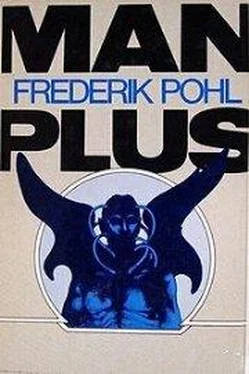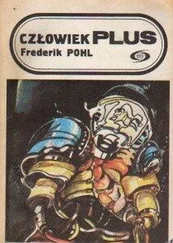Frederik Pohl - Man Plus
Здесь есть возможность читать онлайн «Frederik Pohl - Man Plus» весь текст электронной книги совершенно бесплатно (целиком полную версию без сокращений). В некоторых случаях можно слушать аудио, скачать через торрент в формате fb2 и присутствует краткое содержание. Год выпуска: 1976, ISBN: 1976, Издательство: Random House, Жанр: Фантастика и фэнтези, на английском языке. Описание произведения, (предисловие) а так же отзывы посетителей доступны на портале библиотеки ЛибКат.
- Название:Man Plus
- Автор:
- Издательство:Random House
- Жанр:
- Год:1976
- ISBN:0-394-48676-5
- Рейтинг книги:5 / 5. Голосов: 1
-
Избранное:Добавить в избранное
- Отзывы:
-
Ваша оценка:
- 100
- 1
- 2
- 3
- 4
- 5
Man Plus: краткое содержание, описание и аннотация
Предлагаем к чтению аннотацию, описание, краткое содержание или предисловие (зависит от того, что написал сам автор книги «Man Plus»). Если вы не нашли необходимую информацию о книге — напишите в комментариях, мы постараемся отыскать её.
Won Nebula Award for Best Novel in 1976.
Nominated for Hugo, Locus, and Campbell awards in 1977.
Man Plus — читать онлайн бесплатно полную книгу (весь текст) целиком
Ниже представлен текст книги, разбитый по страницам. Система сохранения места последней прочитанной страницы, позволяет с удобством читать онлайн бесплатно книгу «Man Plus», без необходимости каждый раз заново искать на чём Вы остановились. Поставьте закладку, и сможете в любой момент перейти на страницу, на которой закончили чтение.
Интервал:
Закладка:
“Roger,” said Brad petulantly, “I wish you’d take it easy until we get the jeep ready.”
Roger turned. The other two were back at the steps of the lander, deploying the Mars vehicle from its fold-down condition behind its hatch.
He bounded back toward them joyously. “Need help?”
They didn’t have to answer. They did need help; in their suits it was a major undertaking to slip the retaining strap off one of the basketwork wheels. “Move over,” he said, and quickly freed the wheels and stretched the stilted legs into stand-by position. The jeep had both: wheels for the flat parts, stilts for climbing. It was meant to be the most flexible vehicle man could make for getting around Mars, but it wasn’t. Roger was. When it was done he touched them and promised, “I won’t go out of line of sight.” And then he was gone, off to see the patches of color around a series of hummocks, Dali-bright and irresistible.
“That’s dangerous!” Brad grumbled over the radio. “Wait till we finish testing the jeep! If anything happens to you we’re in trouble.”
“Nothing will,” said Roger, “and no!” He couldn’t wait. He was using his body for what it had been built to do, and patience was gone. He ran. He jumped. He found himself two kilometers from the lander before he knew it; looked back, saw that they were creeping slowly after him and went on. His oxygenation system stepped up the pump-rate to compensate for the extra demands; his muscles met the challenge smoothly. It was not his muscles that propelled him but the servo-systems that had been built in instead; but it was the tiny muscles at the ends of the nerves that ordered the servos. All the practice paid off. It was no effort at all to reach two hundred kilometers an hour, leaping over small cracks and craters, bounding up and down the slopes of larger ones.
“Come back, Roger!” It was Don Kayman, sounding worried. A pause while Roger ran on; then a dizzying sense of movement in his vision, and another voice said, “Go back, Roger! It’s time.”
He stopped flatfooted, skidded, flailed with his wings against the almost indetectable air, almost fell and caught himself. The familiar voice chuckled, “Come on, honey! Be a good boy and go back now.”
Dorrie’s voice.
And out of the distant thin whirl of drifting sand the colors coalesced into the shape of Dorrie to match the voice of Dorrie, smiling, not ten meters away, long legs disappearing into shorts, a gay halter for a top, her hair blown in the breeze.
The radio voice in his head laughed, this time in the tones of Don Kayman. “Surprised you, didn’t we?”
It took a moment for Roger to reply. “Yeah,” he managed. “It was Brad’s idea. We taped Dorrie back on Earth. When you need an emergency signal, Dorrie will give it to you.”
“Yeah,” said Roger again. As he stared, the smiling figure turned wispy, the colors faded, and it disappeared.
He turned and went back. The return trip took a lot longer than the joyous outbound run, and the colors were no longer quite so bright.
Don Kayman drove the jeep steadily toward the trudging shape of Roger Torraway, trying to get the hang of staying in the plunging seat without being thrown back and forth into the restraining belts. It was in no way comfortable. The suit that had been tailored to his body had developed tight spots and loose ones in the long months up from Earth-or maybe, he reminded himself fairly, he was the one who had swelled a little in some places and shrunk in others — he had not, he conceded, been wholly diligent about his exercises. Also he had to go to the bathroom. There was relief plumbing in the suit. He knew how to use it, but he didn’t want to.
Above the discomfort was an overlay of envy and worry. The envy was a sin that he could purge himself of, whenever he could find someone to hear his confession — a venial sin at most, he thought, considering the manifest advantages Roger had over the other two. Worry was a worse sin, not against his God but against the success of the mission. It was too late to worry. Maybe it had been a mistake to set up the simulation of Roger’s wife to punch home urgent messages — at the time, he hadn’t known quite how complicated Roger’s feelings were about Dorrie. But it was too late to do anything about it.
Brad didn’t seem to have any worries. He was chuckling fondly over Roger’s performance. “Did you notice?” he was demanding. “Didn’t fall once! Perfect coordination. Normative match, bio and servo. I tell you, Don, we’ve got it knocked!”
“It’s a little early to tell,” Kayman said uneasily, but Brad went on. Kayman thought of turning off the voice in his suit helmet, but it was almost as easy to turn off his attention. He looked around him. They had landed near the sunrise terminator, but they had used more than half the Martian day in preexit check and in putting the jeep together. It was becoming late afternoon. They would have to be back before it was dark, he told himself. Roger would be able to navigate by starlight, but it would be chancier for Brad and him. Maybe some other time, after they had had the practice… He really wanted that very much, to stroll the ebony surface of a Barsoomian night, with the stars pinpoints of colored fire in a velvet black sky. But not yet.
They were on a great cratered plain. The size was hard to estimate at first. Looking around through his faceplate Kayman had trouble remembering how far away the mountains were. His mind knew, because he knew every grid-square of the Martian maps for two hundred kilometers around their impact point. But his senses were deceived by the absolutely transparent visibility. The mountains to the west, he was aware, were a hundred kilometers away and nearly ten kilometers high. They looked like nearby foothills.
He clutched the jeep down and stopped it; they were within a few meters of Roger. Brad fumbled himself free and slid clumsily out of the seat, lurching in an ungainly slow gait over toward Roger to study him. “Everything all right?” he said anxiously. “Of course it is; I can see that. How’s your balance? Close your eyes, will you — I mean, you know, shut off your vision.” He peered anxiously at the faceted hemispheres. “Did you? I can’t tell, you know.”
“I did,” said Roger through the radio in his head.
“Great! No sense of dizziness, eh? No trouble keeping your balance? Keeping your eyes closed,” he went on, circling Roger and staring at him from all angles, “swing your arms up and down a few times — fine! Now windmill them, opposite directions—” Kayman couldn’t see his face, but he could hear the broad grin in the tone of Brad’s voice. “Beautiful, Roger! Optimal all the way!”
“My congratulations to you both,” said Kayman, out of the vehicle and watching the performance. “Roger?”
The head turned toward him, and though there was nothing about the appearance of the eyes that changed, Kayman knew Roger was looking at him. “I only wanted to say,” he went on, not quite sure where the sentence was going to go, “that I’m — well, I’m sorry we sprang that bit about using Dorrie’s image to convey messages on you. I have a feeling we’ve given you too many surprises.”
“It’s all right, Don.” The trouble with Roger’s voice, Kayman reflected again, was that you couldn’t tell much from its tone.
“Having said that much,” he said, “I think I ought to tell you that we do have another surprise for you. A pleasant one, I think. Sulie Carpenter’s following us up here. Her ship should arrive in about five weeks.”
Silence, and no expression. “Why,” said Roger at last, “that’s very nice. She’s a fine person.”
“Yes.” But the conversation didn’t seem to have anywhere to go after that, and besides Brad was impatient to put Roger through a whole bending and stretching series. Kayman allowed himself the privileges of a tourist. He turned away, staring toward the distant mountains, squinted at the bright sun, which even the auto-darkening of his faceplate didn’t make quite comfortable, then looked around him. Clumsily he managed to kneel and to scoop up a clutch of pebbly dirt in his gloved hand. It would be his job next day to start the systematic collection of samples to return to Earth that was one minor task of the mission. Even after half a dozen manned landings and nearly forty instrumented missions, there was still an insatiable demand for samples of Martian soil in the laboratories of Earth. Right now, however, he was allowing himself to daydream. There was plenty of limonite in this sand, and the quartz pebbles were far from round; the edges were not sharp, but neither had they been milled to roundness. He scraped into the soil. A yellowish powder rested on top; underneath it the material was darker and coarser. There were shiny specks, almost like glass. Quartz? he wondered, and idly scooped around one.
Читать дальшеИнтервал:
Закладка:
Похожие книги на «Man Plus»
Представляем Вашему вниманию похожие книги на «Man Plus» списком для выбора. Мы отобрали схожую по названию и смыслу литературу в надежде предоставить читателям больше вариантов отыскать новые, интересные, ещё непрочитанные произведения.
Обсуждение, отзывы о книге «Man Plus» и просто собственные мнения читателей. Оставьте ваши комментарии, напишите, что Вы думаете о произведении, его смысле или главных героях. Укажите что конкретно понравилось, а что нет, и почему Вы так считаете.












